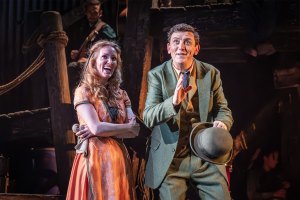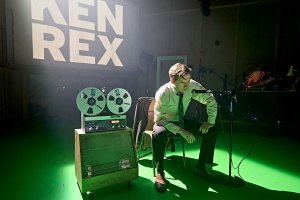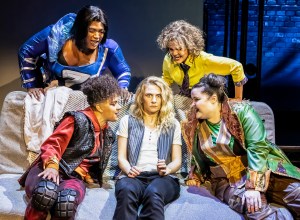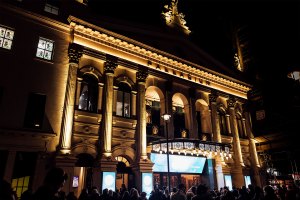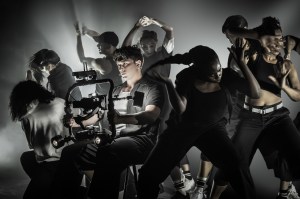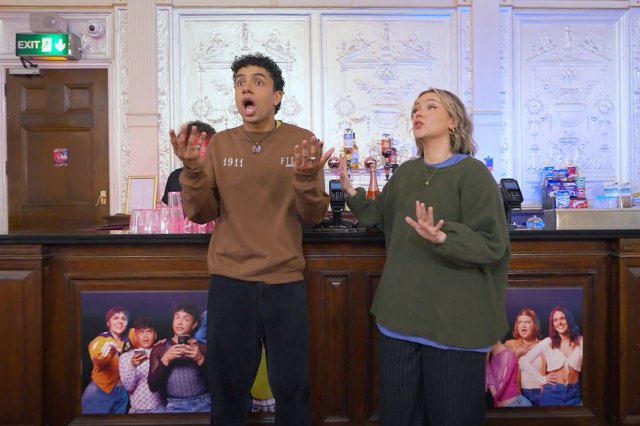A Midsummer Night's Dream (Lyric Hammersmith)
Filter Theatre’s gleefully irreverent take on Shakespeare’s fairy comedy
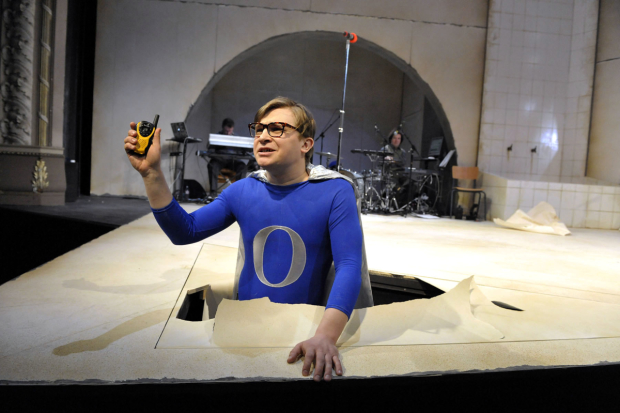
© Keith Pattison
What a feast of invention this production is. Filter Theatre revive their 2011 show, a comic, meta-theatrical romp through Shakespeare‘s comic, meta-theatrical romp. It’s gleefully irreverent towards the text, and knock-you-sideways funny.
That said, it gets off to a slightly slow start. The wheeze is that a director is introducing the show, a rapid, rambling Oirish monologue. But, he lets on, they have a very special guest playing Bottom: Sir Ian McKellen! Well, after some pretty obvious and increasingly tedious business about Sir Ian getting stuck in a lift, and us all needing to go home, a volunteer clambers onstage, cocky that he can manage this acting lark – and a few songs too. From then on in, this Midsummer Night’s Dream finds its rhythm, in more ways than one.
Andrew Buckley is droll as Bottom, but gives it great welly when rocking out on the mic. Ferdy Roberts‘ Puck is a tool-laden stage manager in Lyric T-shirt, can of Fosters in his hand; far from an eager sprite, he has no flying ones to give. Oberon (Jonathan Broadbent) beams in his blue superhero costume, but his invisibility cape is dicey and he usually ends up tripping over himself. No wonder Titania looks so contemptuous. Her fairies, meanwhile, make me grin like a child: there’s no tulle here, just wonderfully 3D whizzing sound effects. I swear I could see one flit across the stage.
Indeed, the magic of Sean Holmes and Stef O'Driscoll's production is far from twee or glittery. Love potion is blue goo spurting suggestively from a squeezy sauce bottle; Bottom’s donkey transformation is conjured only through the sound of coconuts clopping – and a filthy mime. Such sound effects are made quite transparently on stage, with a range of props, instruments and electronics. That this only heightens the enjoyment and proves Filter have tapped into what’s really magical about theatre: the willingness of the imagination, not perfectly recreated reality.
The setting isn’t remotely wood-like; instead, we’re in a scruffy white box of bathroom tiles and white paper, which characters burst through with slap-stick timing. Might this even be a reference to Peter Brook‘s famous white-box version of the play, a tearing up of what once was fresh, now overly revered?
Their structure, too, is smart: when you’re already doing a-play-within-a-play, why not add further layers? Buckley being an amateur enthusiast, desperate to play every part, is both his ‘real’ character and Bottom. Everyone ad-libs, but the Rude Mechanicals in particular sway between Shakespeare’s text and modern chat, yet it rarely jars.
On to the lovers. I don’t think I’ve ever seen so totally, ridiculously lustful snap-transformations from Lysander (John Lightbody) and Demetrius (Hammed Animashaun). Demetrius turns wooing iambic pentameter into pure Marvin Gaye; Lysander matches the band’s burst of squelchy funk with hilariously hot-and-heavy moves (elsewhere, Lightbody also has a lovely, loose delivery of Shakespeare’s lines).
Purists will carp about the liberties taken with the text, but this would be the perfect Shakespeare to take a young, reluctant audience member to. It pulsates with life, in an unfakeable way. Yes, there are moments that try too hard: a video game fight scene should definitely be axed, especially given it follows an already very silly food fight. But overall, this is the sort of show that could spark a love affair with Shakespeare, and is an (im)pure joy for those who already have the an affection.
A Midsummer Night's Dream runs at the Lyric Hammersmith till 19 March.




